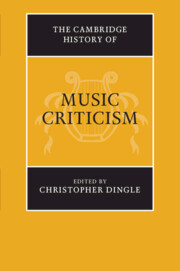Book contents
- The Cambridge History of Music Criticism
- The Cambridge History of Music
- The Cambridge History of Music Criticism
- Copyright page
- Contents
- Music Examples, Figures and Tables
- Notes on Contributors
- Acknowledgements
- Introduction
- Part I The Early History of Music Criticism
- Part II The Rise of the Press
- Part III Critical Influence and Influences
- Part IV Entering the Twentieth Century
- 15 Music Criticism in the United States and Canada up to the Second World War
- 16 Music Criticism in Portugal: Towards an Overview
- 17 Spanish Music Criticism in the Twentieth Century: Writing Music History in Real Time
- 18 Critical Battlegrounds in the French Third Republic
- 19 British Music Criticism, 1890–1945
- 20 Music Criticism in Norway
- 21 Aesthetic Conservatism and Politics in German-Language Music Criticism, 1900–1945
- 22 Music Criticism in Hungary until the Second World War
- 23 The ‘People’ in Czech and Slovak Music Criticism
- Part V New Areas
- Part VI Developments since the Second World War
- Postlude
- Bibliography
- Index
16 - Music Criticism in Portugal: Towards an Overview
from Part IV - Entering the Twentieth Century
Published online by Cambridge University Press: 21 August 2019
- The Cambridge History of Music Criticism
- The Cambridge History of Music
- The Cambridge History of Music Criticism
- Copyright page
- Contents
- Music Examples, Figures and Tables
- Notes on Contributors
- Acknowledgements
- Introduction
- Part I The Early History of Music Criticism
- Part II The Rise of the Press
- Part III Critical Influence and Influences
- Part IV Entering the Twentieth Century
- 15 Music Criticism in the United States and Canada up to the Second World War
- 16 Music Criticism in Portugal: Towards an Overview
- 17 Spanish Music Criticism in the Twentieth Century: Writing Music History in Real Time
- 18 Critical Battlegrounds in the French Third Republic
- 19 British Music Criticism, 1890–1945
- 20 Music Criticism in Norway
- 21 Aesthetic Conservatism and Politics in German-Language Music Criticism, 1900–1945
- 22 Music Criticism in Hungary until the Second World War
- 23 The ‘People’ in Czech and Slovak Music Criticism
- Part V New Areas
- Part VI Developments since the Second World War
- Postlude
- Bibliography
- Index
Summary
The history of music criticism in Portugal is only slowly emerging as a field of musicological inquiry, owing in part to the lack of a systematic inventory of the relevant source materials, but also, no doubt, to the inherited view of the nineteenth century (if not the twentieth) as a period of decadence following a purported ‘golden age’ of Portuguese music – a view amounting to a foundation myth of Portuguese musicology that has only recently begun to be challenged. A reversal of this perspective was first articulated by the composer, essayist and critic Fernando Lopes Graça, who claimed provocatively, as early as 1935, that the nineteenth century had been, on the contrary, ‘the most fruitful, the one with the strongest and most beneficial consequences’, providing the country with the first outline of a modern musical life, less exclusively centred in the court, the church and – in theory, at least – the Italian opera.
- Type
- Chapter
- Information
- The Cambridge History of Music Criticism , pp. 317 - 330Publisher: Cambridge University PressPrint publication year: 2019

